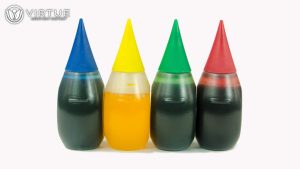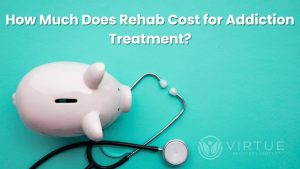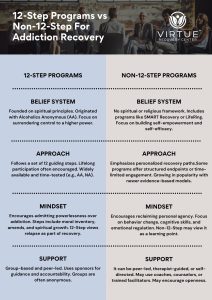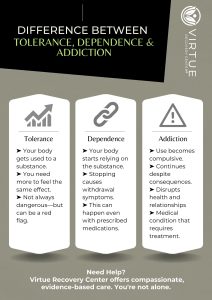Key Takeaways
- The first year of sobriety brings physical, emotional, and mental changes, whether recovering from alcohol or drug addiction.
- Withdrawal symptoms are most intense in the first week and can vary based on substance use history.
- Emotional shifts, cravings, and triggers can persist for months, requiring a strong support system.
- Building new habits and avoiding relapse triggers are key to long-term recovery.
- Understanding the recovery process can help individuals stay committed to a sober lifestyle.

Introduction
Quitting alcohol or drugs is a life-changing decision, but the recovery process is not always easy. The first year of sobriety presents challenges and rewards, and understanding what to expect can help you prepare for success.
The body and mind go through major adjustments when substances are removed. Withdrawal symptoms may last for days or weeks, while emotional struggles and cravings can persist for months. However, with the right support, structure, and coping skills, you can build a healthier, substance-free life.
This guide outlines the addiction recovery timeline and the five key stages of the first year of sobriety. Whether you are recovering from alcohol, opioids, stimulants, or other substances, this roadmap will help you navigate your journey to long-term sobriety.
Stage 1: Days 1-7 – Detox & Withdrawal
The first week of sobriety is often the most physically intense. This is when the body flushes out toxins, and withdrawal symptoms peak. The severity of symptoms depends on the substance used, duration of use, and overall health.
Common Withdrawal Symptoms
- Alcohol & Benzodiazepines: Tremors, sweating, nausea, anxiety, seizures, hallucinations
- Opioids (Heroin, Fentanyl, Prescription Painkillers): Muscle pain, vomiting, diarrhea, intense cravings
- Stimulants (Cocaine, Meth, Adderall): Depression, fatigue, agitation, sleep disturbances
How to Get Through Detox Safely
- Medical detox supervision is recommended, especially for alcohol, benzodiazepines, or opioids, as withdrawal can be life-threatening.
- Hydration and nutrition support physical recovery.
- Medications may be prescribed to ease symptoms.
- Support from professionals and loved ones helps with emotional distress.
Stage 2: Weeks 2-4 – Emotional Shifts & Cravings
After the first week, physical withdrawal symptoms decrease, but the emotional and mental effects of addiction become more noticeable.
Many people experience Post-Acute Withdrawal Syndrome (PAWS), which can last for weeks or months. Common symptoms include:
- Anxiety and depression
- Irritability and mood swings
- Cravings for drugs or alcohol
- Sleep disturbances
Coping Strategies for This Stage
- Therapy and support groups help manage emotions and cravings.
- Exercise and mindfulness practices reduce stress.
- Creating a structured routine provides stability.
- Avoiding triggers (places, people, or activities linked to substance use) lowers relapse risk.
This phase is critical—many people relapse during the first month. Having a strong support system is key to staying sober.
Stage 3: Months 2-3 – Forming New Habits & Avoiding Triggers
At this stage, the mind begins to clear, and life without drugs or alcohol feels more real. However, triggers and cravings can still be challenging.
Common Triggers
- Stress and emotional pain
- Boredom or loneliness
- Social settings with substance use
- Old habits and environments
How to Stay on Track
- Develop healthy routines (exercise, meditation, hobbies).
- Strengthen your support network (friends, family, recovery groups).
- Learn relapse prevention strategies to handle cravings.
- Focus on self-improvement (career, education, relationships).
During this phase, relapse prevention strategies become essential to long-term recovery.
Stage 4: Months 4-6 – Sobriety Strengthens
By now, staying sober becomes easier, and confidence grows. The brain continues healing, and physical and mental health improve.
Positive Changes in This Stage
- Improved mental clarity
- Better relationships with family and friends
- More energy and motivation
- A stronger sense of purpose
Many people feel better than ever, but complacency can be dangerous. Some individuals believe they can use substances occasionally without relapsing, but this often leads back to addiction.
Tips for Staying Focused
- Continue therapy or support meetings.
- Celebrate progress, but stay cautious of relapse risks.
- Engage in meaningful activities (volunteering, work, education).
Stage 5: Months 7-12 – Long-Term Recovery & Life Without Substances
Reaching the one-year mark is a huge milestone! By this point, most people have:
- A stable daily routine
- Better physical and mental health
- Stronger relationships and personal growth
- A greater sense of purpose and self-worth
Keys to Long-Term Sobriety
- Stay engaged in recovery programs (12-step, SMART Recovery, therapy).
- Find purpose through work, hobbies, or volunteering.
- Help others in recovery—it reinforces your own sobriety.
- Remain aware of triggers and stressors that could lead to relapse.
Many people reach one year of sobriety and feel happier and healthier than ever before. Recovery is about more than just not using drugs or alcohol—it’s about building a fulfilling, substance-free life.
Infographic: The Sobriety Timeline
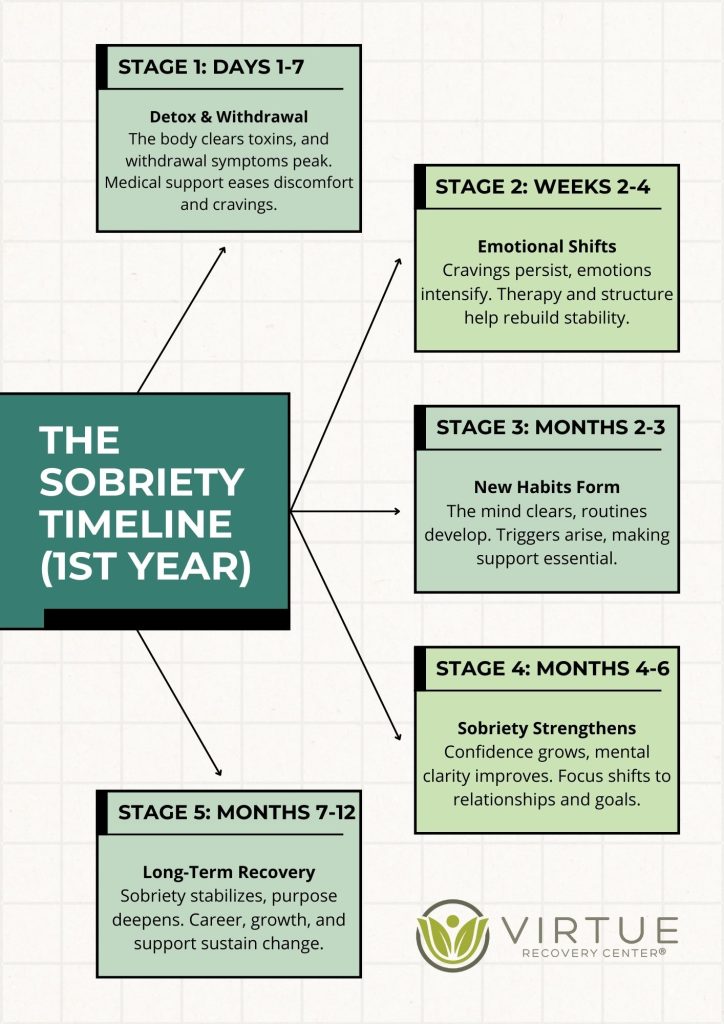
Conclusion: What’s Next in Your Sobriety Journey?
The first year of recovery is full of challenges and victories. Whether you are in the first 30 days or approaching one year sober, every step brings new opportunities for growth.
If you or a loved one need professional addiction treatment, Virtue Recovery Las Vegas is here to help. Our evidence-based programs provide the support, tools, and guidance needed for lasting sobriety.
Call 866-520-2861 today to start your recovery journey!
FAQs
What are the hardest months of sobriety?
The first month is typically the most difficult due to withdrawal symptoms and cravings. Emotional struggles may last several months, but they improve over time.
How can I manage cravings during recovery?
Cravings can be managed through therapy, support groups, exercise, mindfulness, and avoiding triggers. Having a strong support system is essential.
Is relapse common in the first year of recovery?
Yes, relapse is common. However, it doesn’t mean failure—it’s part of the process. The key is to learn from it, seek support, and keep going.
How does quitting drugs or alcohol affect mental health?
At first, withdrawal can cause depression, anxiety, and mood swings, but over time, sobriety leads to improved mental clarity, emotional stability, and reduced stress.
What are the benefits of one year of sobriety?
After one year sober, most people experience:
- Improved physical health
- Better relationships
- Stronger mental well-being
- Greater self-confidence and personal growth
Resources
https://nida.nih.gov/publications/drugs-brains-behavior-science-addiction/treatment-recovery
https://medium.com/@chrisboutte/taking-it-easy-the-first-year-of-sobriety-221e8b4648c
https://www.healthline.com/health/alcohol/stages-of-alcohol-recovery



